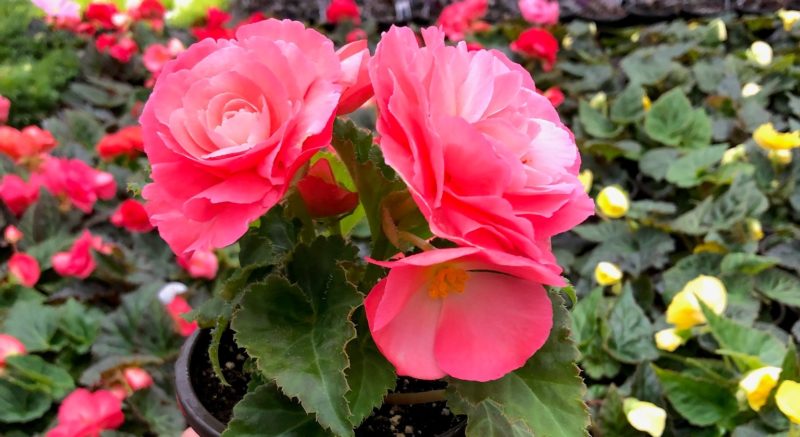
Culture Report: Begonia Prism Series
The genus begonia is one of the most diverse in the plant kingdom and continues to provide our industry with a diverse assortment of varieties to meet the demands of increasingly well-informed and savvy plant consumers. Whether in sun or shade, fibrous rooted or rhizomatous, potted or bedding, begonias provide an easy-to-grow option for the plant novice, the loft-dwelling urbanite, or seasoned gardeners alike. For breeders, it is a deep pool of genetic possibilities. A challenging plant to work with but rewarding if good crosses are made and selected.
BACKGROUND
Tuberous begonias, specifically, have become a staple of our industry for their massive flowers and flexibility on sun/shade requirements. But, as the name implies, these begonias will form an underground storage organ under short daylengths or stressful conditions. And, although breeding has made growing this class of begonia easier to produce and grow, some advancements, specifically flower size and quantity, have created other production issues.
With large, abundant flowers, you create a food source for Botrytis once the old blooms drop, especially the first few flowers, which tend to be covered by rapidly growing foliage. This low air movement environment, combined with the spent flowers, and moisture from regular watering can lead to serious Botrytis outbreaks, which can cause losses or require additional chemical applications to control.
The Prism series of tuberous begonias from Westhoff not only brings a new option for shade annuals but offers a leap forward in breeding. With a full line of colors, Prism begonias were selected for vigor and, most importantly, for flowers held above the foliage. This combination of features makes them a superior option for homeowners and growers alike; more flowers on display for gardeners, fewer disease issues and losses due to buried blooms for growers.
CULTURE GUIDELINES
As with other tuberous begonias from seed, Prism begonias have a very long crop cycle from seed to finished plant, and there are very specific requirements for consistent success, so growing from seed is only recommended for the most experienced young plant producers. However, if you are sowing seed, it is always importa nt to remember to keep freshly sown seed in high humidity conditions, until cotyledons are fully emerged, to prevent the newly emerged seedlings from drying out.
nt to remember to keep freshly sown seed in high humidity conditions, until cotyledons are fully emerged, to prevent the newly emerged seedlings from drying out.
Once cotyledons are expanded, the humidity levels can be gradually reduced. Light is also necessary for germination, so do not cover the seed, and make sure the days are over 12 hours; 14-hour days are recommended, even as seedlings.
Prism begonias are long-day plants and need at least 14 hours of daylight to continue healthy growth, otherwise they will begin to divert resources to tuber development. Night breaks are effective, but daylength extension is recommended. Maintain warm growing conditions to prevent temperature stresses and encourage healthy full growth. Moderate rates of fertility (150-ppm nitrogen) are recommended with occasional clear water to leach out accumulated salts but avoid high levels of ammonium to prevent excessive foliage growth.
Growth control can be achieved by proper scheduling and growing conditions, but can be assisted using chemical growth regulators like chlormequa t at 250ppm. Extensive trialing should be performed before committing to widescale use of any chemical growth regulators.
t at 250ppm. Extensive trialing should be performed before committing to widescale use of any chemical growth regulators.
If you produce tuberous begonias, or if you have in the past and had trouble, Prism begonias are the new series for the efficient, economical grower that wants to provide the absolute best quality finished plants for their customers. Seed is commercially available from your preferred seed broker, and young plants are widely available at the most popular suppliers nationwide.









 Video Library
Video Library 


















